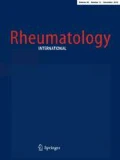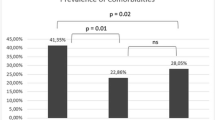Abstract
The aim of this study was to compare anti-tumor necrosis factor-α (TNFα) treatment status in rheumatoid arthritis (RA) patients with the Korean National Health Insurance (KNHI) reimbursement eligibility criteria and with American College of Rheumatology (ACR) recommendations, Japan College of Rheumatology (JCR) guidelines and British Society for Rheumatology (BSR) guidelines. Between December 2011 and August 2012, outpatients from 17 South Korean general hospitals diagnosed with RA according to the 1987 ACR criteria were enrolled into a noninterventional, cross-sectional, observational study. Of 1700 patients (1414 female (83.2 %), mean age of 56.6 ± 12.0, mean disease duration 97.9 ± 91.8 months), 306 (18.0 %) had used anti-TNFα agents, and 224 (13.2 %) were currently using an anti-TNFα agent. Of 1394 anti-TNFα-naive patients, 32 (2.3 %) met KNHI reimbursement guidelines, 148 (10.6 %) met ACR recommendations, and 127 (9.1 %) and 126 (9.0 %) were considered eligible for anti-TNFα agents according to JCR and BSR guidelines, respectively. The main discrepancy was the higher active joint count required by the KNHI eligibility criteria. In the opinion of treating rheumatologists, the KNHI reimbursement criteria ineligibility accounted for 15.3 % (n = 213) of the reasons for not initiating anti-TNFα agents in anti-TNFα-naive group. The anti-TNFα user group showed significantly higher disease activity than the anti-TNFα-naive group based on DAS28 score. In comparison with the ACR recommendations and JCR and BSR guidelines, fewer patients met KNHI reimbursement eligibility criteria for anti-TNFα agents. The current amendment of the KNHI criteria based on DAS28 score will improve an access to biologic agents including anti-TNFα treatment for South Korean patients with active RA.
Similar content being viewed by others
References
Klareskog L, Catrina AI, Paget S (2009) Rheumatoid arthritis. Lancet 373:659–672. doi:10.1016/S0140-6736(09)60008-8
Fauci ASBE, Kasper DL, Hause SL, Longo DL (2012) Harrison’s principles of internal medicine, 18th edn. McGraw-Hill, New York
Combe B, Landewe R, Lukas C, Bolosiu HD, Breedveld F, Dougados M et al (2007) EULAR recommendations for the management of early arthritis: report of a task force of the European Standing Committee for International Clinical Studies Including Therapeutics (ESCISIT). Ann Rheum Dis 66:34–45
DE Furst, Breedveld FC, Kalden JR, Smolen JS, Burmester GR, Sieper J et al (2007) Updated consensus statement on biological agents for the treatment of rheumatic diseases, 2007. Ann Rheum Dis 66(Suppl 3):iii2–iii22
Putrik P, Ramiro S, Kvien TK, Sokka T, Pavlova M, Uhliq T et al (2014) Inequities in access to biologic and synthetic DMARDs across 46 European countries. Ann Rheum Dis 73:198–206. doi:10.1136/annrheumdis-2012-202603
Putrik P, Ramiro S, Keszei AP, Hmamouchi I, Dougados M, Uhlig T, et al. (2015) Lower education and living in countries with lower wealth are associated with higher disease activity in rheumatoid arthritis: results from the multinational COMORA study. Ann Rheum Dis. pii: annrheumdis-2014-206737. doi: 10.1136/annrheumdis-2014-206737
Singh JA, Furst DE, Bharat A, Curtis JR, Kavanaugh AF, Kremer JM et al (2012) American College of Rheumatology recommendations for the use of disease-modifying antirheumatic drugs and biologic agents in the treatment of rheumatoid arthritis. Arthritis Care Res (Hoboken) 64:625–639. doi:10.1002/acr.21641
Ledingham J, Deighton C (2005) British Society for Rheumatology Standards, Guidelines and Audit Working Group. Update on the British Society for Rheumatology guidelines for prescribing TNFalpha blockers in adults with rheumatoid arthritis (update of previous guidelines of April 2001). Rheumatology (Oxford) 44:157–163
Koike R, Takeuchi T, Eguchi K, Miyasaka N (2007) Japan College of Rheumatology. Update on the Japanese guidelines for the use of infliximab and etanercept in rheumatoid arthritis. Mod Rheumatol 17:451–458
Won SY, Sung YK, Cho SK, Choi CB, Koh EM, Kim SK et al (2014) Prediction for TNF inhibitor users in RA patients according to reimbursement criteria based on DAS28. J Rheum Dis 21:64–73. doi:10.4078/jrd.2014.21.2.64
TNF inhibitors use guidelines for rheumatoid arthritis (RA) (in Japanese), 12 Mar 2015 revised edition. http://www.ryumachi-jp.com/info/guideline_tnf.pdf
Geens E, Geusens P, Vanhoof J, Berghs H, Praet J, Esselens G et al (2009) Belgian rheumatologists’ perception on eligibility of RA patients for anti-TNF treatment matches more closely Dutch rather than Belgian reimbursement criteria. Rheumatology (Oxford) 48:546–550. doi:10.1093/rheumatology/kep018
Singh JA, Furst DE, Bharat A, Curtis JR, Kavanaugh AF, Kremer JM et al (2012) American College of Rheumatology recommendations for the use of disease-modifying antirheumatic drugs and biologic agents in the treatment of rheumatoid arthritis. Arthritis Care Res (Hoboken) 64:625–639. doi:10.1002/acr.21641
Goekoop-Ruiterman YP, de Vries-Bouwstra JK, Allaart CF, van Zeben D, Kerstens PJ, Hazes JM et al (2005) Clinical and radiographic outcomes of four different treatment strategies in patients with early rheumatoid arthritis (the BeSt study): a randomized, controlled trial. Arthritis Rheum 52:3381–3390
Ward MM, Javitz HS, Yelin EH (2000) The direct cost of rheumatoid arthritis. Value Health 3:243–252
Curkendall S, Patel V, Gleeson M, Campbell RS, Zagari M, Dubois R (2008) Compliance with biologic therapies for rheumatoid arthritis: do patient out-of-pocket payments matter? Arthritis Rheum 59:1519–1526. doi:10.1002/art.24114
Bodur H, Ataman S, Akbulut L, Evcik D, Kavuncu V, Kava T et al (2008) Characteristics and medical management of patients with rheumatoid arthritis and ankylosing spondylitis. Clin Rheumatol 27:1119–1125. doi:10.1007/s10067-008-0877-1
Acknowledgments
This study was supported by Janssen Korea Ltd.
Funding
This study was supported by Janssen Korea Ltd.
Author information
Authors and Affiliations
Corresponding author
Ethics declarations
Conflict of interest
Jin-Wuk Hur, Jung-Yoon Choe, Dong-Wook Kim, Sang-Hyon Kim, Wan-Uk Kim, Yun Sung Kim, Hye-Soon Lee, Sang-Heon Lee, Sung-Hwan Park, Yong-Beom Park, Chang-Hee Suh, Seung-Cheol Shim, Yeong-Wook Song and Bo Young Yoon declare that they have no conflict of interest. Hyun Ah Kim has served on advisory boards for Hanmi-Pharmaceutical and Pfizer. Won Park and Dae Hyun Yoo are scientific consultants for Celltrion. Dae Young Yu is an employee of Janssen.
Rights and permissions
About this article
Cite this article
Hur, JW., Choe, JY., Kim, DW. et al. Rheumatoid arthritis patients fulfilling Korean National Health Insurance reimbursement guidelines for anti-tumor necrosis factor-α treatment and comparison to other guidelines. Rheumatol Int 35, 1817–1823 (2015). https://doi.org/10.1007/s00296-015-3353-7
Received:
Accepted:
Published:
Issue Date:
DOI: https://doi.org/10.1007/s00296-015-3353-7



